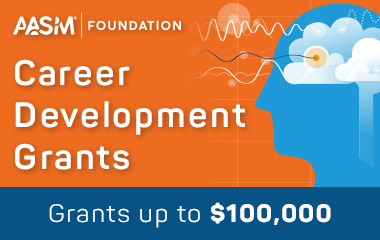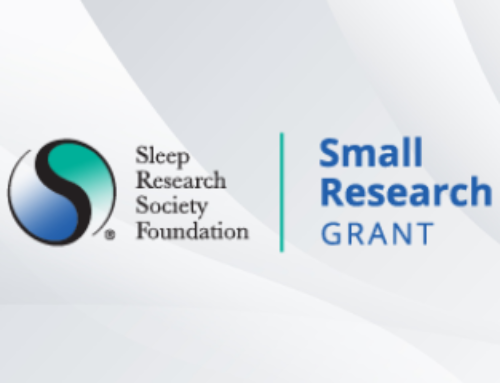We are delighted to announce an almost $570,000 investment in nine projects for cycle 2 of our 2024 Career Development Grants.
2024 Bridge to Success Grant Recipient

High blood pressure during sleep is associated with an increased risk of cardiovascular disease. This project will collect feasibility data to determine whether unhealthy sleep behaviors are linked to higher blood pressure during sleep when measured within the home environment and if a sleep intervention can change blood pressure during sleep.
2024 Physician Scientist Training Grant Recipients

REM sleep behavior disorder (RBD) is strongly associated with alpha-synucleinopathy neurodegenerative disease. Few neuropathologic studies have been performed in RBD, and little is known about the effect of multiple pathologies in RBD. This project will aim to understand better the breadth of pathologies underlying RBD and the impact of underlying neuropathology on RBD neurophysiology and clinical progression.

While we know that sleep apnea is a disorder of repeated upper airway obstruction during sleep, existing tools for evaluating upper airway behavior during sleep are limited. This project aims to test the feasibility of a new MRI system to evaluate the role of obesity on upper airway behavior. This study will help us better understand how excess weight affects sleep breathing and, thus, how weight loss may influence upper airway behavior.
2024 Diversity Supplement Grant Recipient

This project addresses the lack of culturally tailored preoperative insomnia interventions for older US Latino surgical patients. We will adapt the CBT-I Coach app for this population through focus groups, translations, and usability testing. Feasibility, acceptability, and efficacy will be evaluated in a pilot trial with 10 participants. We predict that the tailored intervention will reduce insomnia severity and improve postoperative outcomes.
2024 Focused Projects Grant for Junior Investigators Recipients

Evening sleep problems are prevalent in early childhood and increase the risk for poor behavioral and health outcomes. Informed by accumulating evidence of the early circadian system’s high sensitivity to evening light, this project will examine the feasibility, acceptability, and preliminary efficacy of evening light mitigation strategies to advance sleep and circadian timing in children, with the goal of improving early sleep health.
This grant was made possible by Madeleine Grigg-Damberger, MD.

Sleep deficits are common in Parkinson’s Disease (PD), severely impacting patients’ health and quality of life. Previous research in PD mouse models has shown that reduced dopamine levels correlate with shorter, fragmented sleep, mirroring patient patterns. This project uses this mouse model to investigate how dopaminergic activity and downstream circuits affect sleep and whether targeted interventions can alleviate these deficits.

This project investigates the role of parabrachial pituitary adenylate cyclase-activating polypeptide (PACAP) neurons in regulating sleep-wake states. By using advanced techniques to monitor real-time neuronal activity and assess the effects of inhibiting PACAP cell bodies or terminals. The findings may uncover novel neural circuits and pathways critical for managing arousal and sleep, potentially leading to therapeutic strategies for hyperarousal disorders and improved sleep quality.

Cardiovascular disease risk is linked to short and long sleep duration, but the genetic factors driving this relationship in diverse populations remain unclear. This project will use whole-genome sequencing and a novel genome-pleiotropy pipeline to identify genetic variants associated with sleep duration and their connection to cardiovascular traits. By uncovering causal variants, we aim to identify therapeutic targets to improve outcomes.sensitive compared to the current standard in health economic evaluations, which consists of using generic instruments.

Positive airway pressure therapy is highly effective for treating obstructive sleep apnea but is limited by adherence rates of less than 50% in children. This project is a prospective cohort study to assess the impact of coexisting baseline insomnia on positive airway pressure therapy adherence. The results of this study will inform the design of targeted treatment plans for comorbid insomnia and sleep apnea in children.
This grant was made possible by Madeleine Grigg-Damberger, MD.






